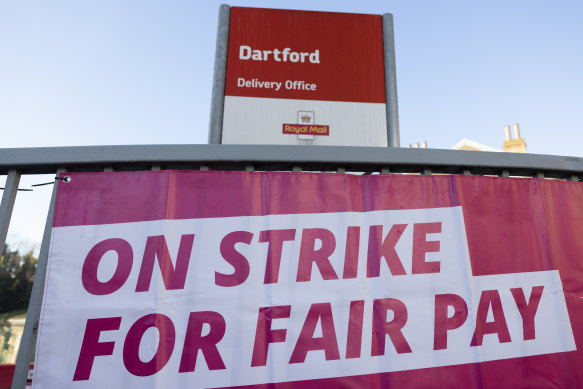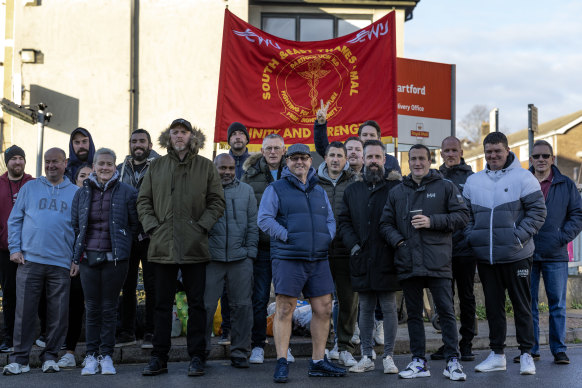
Airport executives said the level of disruption would depend on whether the Home Office could deploy back-up.

A sign hangs on a picket line at Dartford delivery office in Dartford, England. Credit:Getty
The government has called on hundreds of Armed Forces personnel to stand in for airport workers, and potentially to cover for ambulance drivers and firefighters as well.
British Prime Minister Rishi Sunak said on Wednesday he was working on “new tough laws” to limit the impact of strikes which could cause major travel disruption.
Sunak told the House of Commons that if “union leaders continue to be unreasonable, then it is my duty to take action to protect the lives and livelihoods of the British public”.
Loading
He has pledged a number of times since moving into Downing Street on October 26 that he would bring in tougher laws to curb the walkouts, but the details of any legislation are still unknown.
“If union leaders are not going to be reasonable, then I need to do what I need to do in order to keep people safe, and to ensure that people can go about their day-to-day lives free of the enormous disruption that these strikes are going to cause,” he said.
The NHS has been in crisis due to a critical lack of staff, with waiting times in hospital emergency rooms blowing out beyond 12 hours.
Following two intense years of the pandemic, there is widespread sympathy for nurses who earn an average annual wage of £35,500 ($64,330).
Members of the RMT, the largest railway union which is locked in disputes with both infrastructure owner Network Rail and 14 train operating companies, are set to walk out and cause the shutdown of large parts of the network for most of next week.

Postal workers stand on a picket line outside Dartford delivery office in Dartford, England. Credit:Getty
The rail industry has told passengers to only travel if necessary on December 13, 14 and 16, 17.
The union, which has rejected an 8 per cent wage increase over two years, has staged a series of strikes since the northern summer involving about 40,000 rail workers, with action planned by Network Rail workers from 6.30pm on Christmas Eve until December 27.
They will then be joined by workers at the train companies for strikes on January 3 and 4 and January 6 and 7.
RMT boss Mick Lynch said the government was ultimately to blame for the walkouts.
“We regret the inconvenience that we are causing but this inconvenience is being caused by the government who are running the playbook and the strategy for the railway companies and directing what is going on,” he told the BBC. “They have held back even these paltry offers to the last minute so they know it is very difficult for us to deal with these offers.”
Get a note directly from our foreign correspondents on what’s making headlines around the world. Sign up for the weekly What in the World newsletter here.






